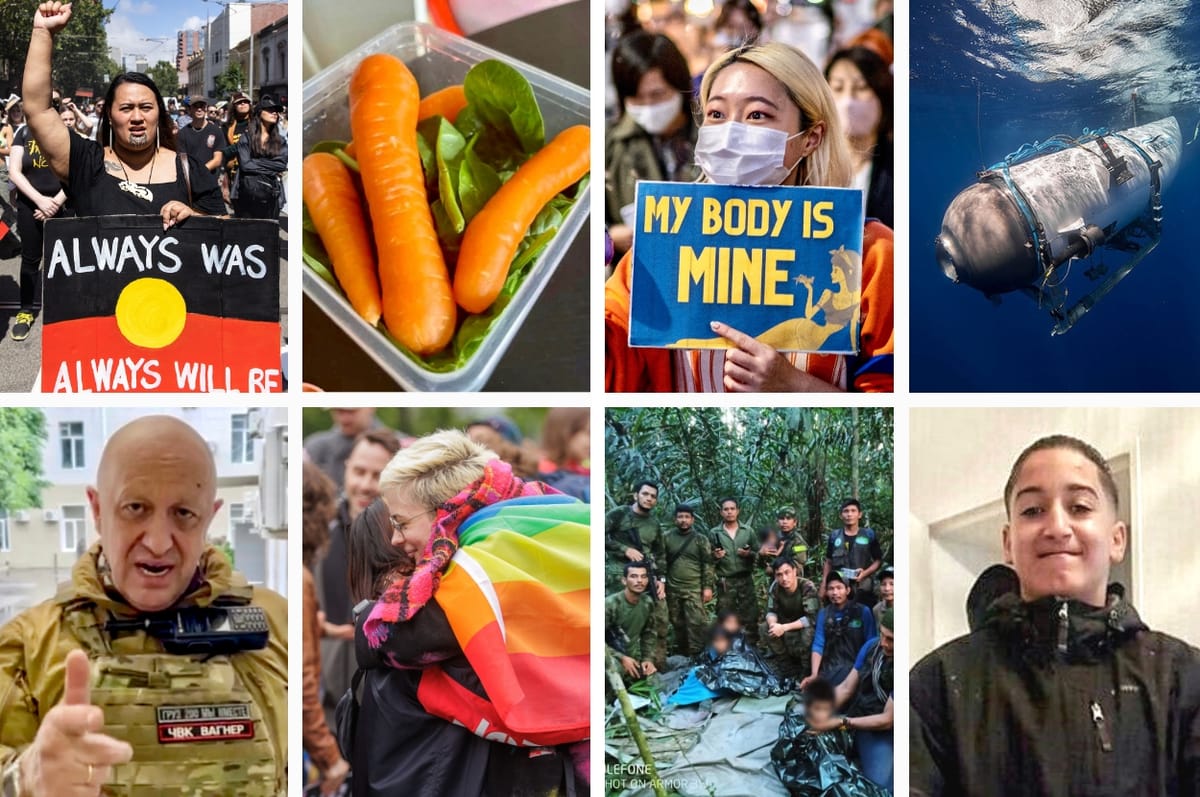Here’s What Happened Around The World In June 2023
Take a look back at some of the biggest stories that happened around the world in June 2023.

Take a look back at some of the biggest stories that you may have missed in June 2023.
1. These five men went on a submersible to see the Titanic wreckage but died after the vessel imploded
Five people who went missing after they embarked on a trip in a submersible vessel – a mini submarine – to see the wreckage of the Titanic died after the vessel imploded.
The company operating the submersible, Oceangate, said in a statement on June 22 that they believe the five men had “sadly been lost” after they went missing on Sunday June 18.
On Friday, June 16, the expedition left Newfoundland in Canada to the Titanic wreckage site as part of a eight-day trip, which cost US$250,000 per person.
The five passengers included British billionaire, Hamish Harding; a member of Pakistan’s richest families, Shahzada Dawood, and his teenage son; French maritime expert, Paul-Henri Nargeolet; and the founder and CEO of Oceangate, Stockton Rush.
The dive on Sunday was supposed to only take two and a half hours, but the submersible lost contact one hour and 45 minutes after departure.
On Thursday, the US Coast Guard reported finding debris pertaining to the submarine, which they said had undergone a “catastrophic implosion.”
Search officials said they hope the announcement brings some solace to the families and will continue to investigate why it happened.
2. This 17-year-old French teen was shot dead by police, causing huge riots.
Nahel M., who was of Algerian descent, had been driving in Nanterre, a suburb in Paris, at around 8am on Tuesday June 27 when he was stopped by two police officers.
Video of the incident shared on social media showed one officer firing at point blank range towards the driver’s seat when the car drove off after a short conversation with the officers.
Despite being attended to by emergency services, Nahel was pronounced dead at 9:15am “following at least one gunshot wound”, according to a statement from the Nanterre prosecutor’s office, CNN reported.
Paris’ police chief told French BFMTV that the car had been pulled over for refusing to comply with their instructions, CNN reported.
The police officers had said they had shot Nahel in self-defense as he had driven towards them, according to French media, Le Monde.
However, this account has been brought into question with the video and by Nahel’s family.
The police officer who fired the gun, who has not been identified, was placed in custody and was detained on charges of voluntary homicide on Thursday.
News of Nahel’s death sparked protests and riots across Paris against police brutality, in particular against people from immigrant backgrounds.
3. An armed mutiny broke out in Russia, got within 200 kilometers of Moscow but was abruptly stopped.
On Friday June 23, Yevgeny Prigozhin, the leader of the Wagner private military group, which has been fighting alongside Russia, filmed a video where he questioned Russia’s invasion of Ukraine, saying it was based on lies.
The Wagner group then withdrew from Ukraine, occupied the Russian city of Rostov-on-Don and started heading for Moscow.
The next morning, Russian president Vladimir Putin made a nationwide address, where he called the armed rebellion “treason” and “a knife in the back of Russia and its people”, adding that those who betrayed Russia would pay.
Suddenly, at 8:30pm on Saturday, Belarus’ president Aleksander Lukashenko announced that he had brokered a deal with Prigozhin to stop the uprising.
Prigozhin said his forces had come within 200 kilometers of Moscow but was turning back to “prevent bloodshed”.
The Kremlin said Prigozhin will move to Belarus as part of the deal, and all charges against him will be dropped.
The mutiny has been widely described as a hit to Putin’s strongman image and the biggest challenge to his 23-year rule.
4. Japan finally raised the age of sexual consent from 13 to 16
Japan finally raised the country’s age of sexual consent from 13 to 16 as part of a wider reform of its laws on sex crimes.
The law was proposed after the acquittal of several accused rapists in 2019, which sparked public outrage.
Under Japan’s previous law, victims needed to prove that there was violence and intimidation and that they had been unable to physically resist in order to secure a conviction.
The new law, which was passed unanimously on June 16, expands the definition of rape from “forcible sexual intercourse” to “non-consensual sexual intercourse”.
It also clearly outlines eight situations that are considered rape, including when the victim is under the influence of alcohol or drugs, or if the perpetrator frightens them or takes advantage of their social status.
The new law also makes grooming minors and voyeurism, such as when people take upskirt photos or videos or secretly film sexual acts, a crime.
Previously, Japan had the lowest age of sexual consent among developed countries.
5. People in Poland held a huge, unprecedented pro-democracy protest against the right-wing government
On June 4, hundreds of thousands of people took to the streets of Warsaw to protest against Poland’s right-wing government run by the Law and Justice Party, also known as PiS.
Since it came to power in 2015, the Law and Justice party has eroded democracy and attacked human rights by taking away the independence of the country’s top court.
In 2020, the court ruled in favor of a law that bans abortions in almost all cases, except in instances of rape, incest or if there is a threat to the woman’s health or life.
And in recent years, with the government’s support, more than 90 regions in Poland declared themselves to be “LGBT-free” zones – areas that are unwelcoming of “LGBTQ ideology”.
The protest was the biggest demonstration the country has seen since the fall of communism in 1989.
People from all around the country traveled to Warsaw to participate in the march, which was attended by an estimated half a million people, organizers said.
Former Polish prime minister and president of the European Council Donald Tusk, who is leading the opposition Civic Platform party, was present, alongside former president Lech Wałęsa who helped to end communist rule in Poland.
The demonstration comes ahead of elections which will be held by November this year.
6. Canada was hit by wildfires that were so bad that the smoke blew all the way to New York
Canada is facing its most severe fire season in history as more than 413 active wildfires, including 249 deemed out of control, rage across the country.
A string of blazes have rapidly spread to almost all Canadian provinces due to the unusually hot and dry weather, with some of the worst cases caused by lightning.
Around 26,000 residents have fled from their homes in Quebec and the Eastern Canadian province of Nova Scotia.
No injuries have yet been reported.
The fires triggered health alerts as the smoke has caused poor air quality throughout Canada and has drifted south to as far as New York in the US.
On the evening of June 6, New York recorded the worst air quality and pollution in the world, surpassing cities like Delhi in India, Baghdad in Iraq and Dubai, United Arab Emirates, according to IQAir, a Swiss technology company that monitors air quality.
7. Nepal became the world’s first least developed country to legalize same-sex marriage
Nepal’s Supreme Court issued a temporary order to allow same-sex marriages on Wednesday June 28.
Now, same-sex couples and people who identify as third gender can register their marriage and enjoy the same rights as heterosexual married couples.
It is now the second country in Asia to legalize same-sex marriage after Taiwan.
The court still has to issue a final decision, but temporary orders generally have a significant impact on the outcome of a case.
8. Estonia also legalized same-sex marriage and adoption
Estonia has legalized same-sex marriage and adoption after a historic vote at its parliament.
Same-sex partnerships have been legal in Estonia since 2016 but only heterosexual couples could get married.
Same-sex couples were also unable to adopt children together; one partner had to adopt the biological child or children of the other partner as a step-parent.
But on June 20, Estonia’s parliament voted to amend the law so that two adults can marry “regardless of their gender” and adopt children together.“
The new law will go into effect starting January 1, 2024.
9. Iceland officially banned LGBTQ conversion therapy
Iceland has passed a law banning conversion therapy, a widely discredited practice that seeks to change or suppress a person’s sexual orientation, gender identity or gender expression.
So-called conversion therapy relies on the assumption that sexual orientation or gender identity can be changed or “cured.”
Some of these techniques include talk and behavioral therapy and medical treatments.
Passed unanimously by Iceland’s parliament on June 9, the new law makes it illegal for people to practice conversion therapy.
People found guilty of practicing conversion therapy on adults may face up to three years in prison.
10. Four Indigenous children were found alive after surviving 40 days in the Colombia jungle following a plane crash
After 40 days of intense search operations, four Indigenous children have finally been found alive after their plane crashed in the Colombian jungle.
13-year-old Lesly, nine-year-old Soleiny, four-year-old Noriel and one-year-old Cristin Neryman had been flying with their mother and another passenger to reunite with their father when the plane crashed into the jungle in southern Colombia after its engine failed on May 1.
Authorities were able to locate the plane two weeks later, when they discovered the bodies of three adults, including the children’s mother and pilot, but were unable to locate the children.
However, rescuers believed the children were still alive as they kept finding structures that looked like shelters and half-eaten food.
Finally, on Friday June 9, after 40 days, Colombia’s president Gustavo Petro tweeted that the children had been found alive.
Officials said the children had managed to survive thanks to their knowledge of the environment and the leadership of their oldest 13-year-old sister.
11. This Taiwanese woman said she was sexually harassed by a filmmaker and started the country’s first #MeToo movement
More than a dozen of women in Taiwan have come forward with stories of sexual harassment, sparking the country’s first #MeToo movement.
On May 31st, a former staff member from Taiwan’s ruling Democratic Progressive Party (DPP) said in a Facebook post that she had been sexually harassed while working for the political party in September 2022.
Chen Chien-jou (陳汘瑈) said she eventually found the courage to speak out after being inspired by a young woman character in the recent Taiwanese Netflix show Wave Makers, which follows a group of political staff members during election season in Taiwan.
In her post, Chen said that she had been sexually harassed by a filmmaker on a shoot while she was working for the DPP.
The stories started a #MeToo movement, leading to at least two top DPP officials to resign.
On Tuesday June 6, Taiwan’s first woman president Tsai Ing-Wen apologized to the victims of sexual harassment and promised to investigate the incidents.
Taiwan is often viewed as one of the most progressive and democratic countries in Asia – having elected a woman president and legalized same-sex marriage, but its culture remains conservative and patriarchal, and women frequently face stigma for speaking out.
However, this is the first time victims have actively come forward to share their experiences, despite previous #MeToo marches.
12. Three trains collided in India and killed at least 275 people
At least 275 people were killed and more than 1,175 others were injured in India after three trains collided with each other on June 2.
It is the worst train accident in India in two decades.
A preliminary investigation found the cause of the accident was signal error that led the first train to wrongly change tracks and drive into a freight train, officials said.
Another passenger train traveling in the opposite direction at the same time then crashed into the derailed carriages, which had fallen onto the parallel tracks.
Authorities said they would be looking into what had caused the signal error.
The crash has renewed calls for authorities to address the safety of India’s railway system, which transports more than 13 million passengers every day in the world most populous nation, according to CNN.
13. Almost 90 Afghan girls were poisoned in another attack on their education
89 Afghan schoolgirls and their teachers have been hospitalized after being poisoned in two deliberate attacks at two girls’ schools, officials said.
The attack occurred in elementary schools in the northern province of Sar-e-Pul, poisoning 60 students in the Naswan-e-Kabod Aab school and 17 students in the Naswan-e-Faizabad school, according to education officials.
Officials said both primary schools are near each other and were targeted one after the other.
Most of the girls caught in the attack were between six to 12 years old.
Authorities have opened an investigation and suspect the attack was motivated by a personal grudge.
Since the Taliban takeover in August 2021, girls have been banned from attending middle school high school and university.
14. People in China started sharing photos of “white people meals” and honestly they kind of have a point
Chinese people shared photos of “white people meals” on social media and it’s going viral for being hilariously accurate.
The trend was initially started by Chinese people working or studying overseas who were stunned by their Western peers’ simple lunches that only contained a few carrots, raw spinach, cheese and crackers.
People then started sharing photos of what they call “white people meals” – cold, raw food that requires minimal preparation, on the Chinese social media app Xiaohongshu.
Now, people in China have even turned “white people meals” into a diet that they are following to lose weight.
Other Chinese people are praising “white people meals” as a solution to their hectic work schedules because they don’t have enough time to prepare lunch.
15. People in Switzerland voted to drastically cut its carbon emissions and reach net zero by 2050
In a referendum, the majority of people in Switzerland voted to pass a new law that will drastically cut carbon emission and reach in net zero by 2050.
The bill was first proposed in September 2022, after activists and scientists campaigned to save Switzerland’s iconic glaciers, which are melting at an alarming rate.
It was supported by almost all parties except the right-wing Swiss People’s Party (SVP), which argued the law would increase energy prices and become too costly and triggered a referendum against it.
However, on June 18, the majority of Swiss people – 59.1% – voted in favor of the Climate and Innovation law.
The new law will speed up cutting carbon dioxide emissions and rolling out renewable energy, in particular solar energy.
In a separate referendum also on Sunday, 78.5% of voters also backed a law to introduce a global minimum tax rate of 15% for multinational companies.
16. And Australia will finally hold a referendum on including Indigenous people in its constitution
The Australian parliament passed a bill to hold a referendum on recognizing Aboriginal people in the country’s constitution on June 19.
Currently, Australia’s constitution does not include any mention of Indigenous Australians, who have occupied the country for at least 65,000 years.
Indigenous Australians make up about 3.2% of Australia’s population but historically been marginalized.
The referendum will ask Australians if they agree to alter the constitution to create a committee of Indigenous representatives.
If passed, it would require consultations with Indigenous people on decisions that affect their lives, according to Reuters.
Australian Indigenous leaders have called the referendum a historic step towards recognition and reconciliation.




